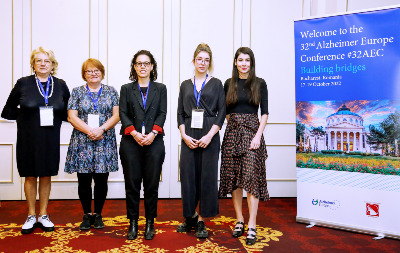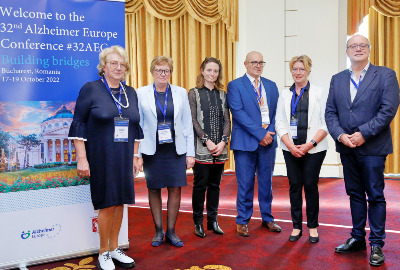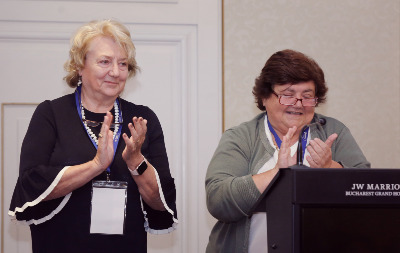|
Bucharest, 20 October 2022 – Yesterday was the third and final day of the 32nd Alzheimer Europe Conference (#32AEC) “Building bridges”. The plenary sessions for this final day were focused on European collaboration and on making dementia a care, policy and research priority.
Building bridges across Europe
 Plenary four opened the conference programme on this final day, and comprised four presentations revolving around the theme “Building bridges across Europe”. The session was chaired by Alzheimer Europe Chairperson Iva Holmerová. Plenary four opened the conference programme on this final day, and comprised four presentations revolving around the theme “Building bridges across Europe”. The session was chaired by Alzheimer Europe Chairperson Iva Holmerová.
Cătălina Tudose, President of Societatea Română Alzheimer (Romanian Alzheimer Society), discussed “Progress of Dementia Care System in Romania as a Consequence of European Integration and Support”. She gave an overview of the history of the Romanian Alzheimer Society, which was set up in 1992, and joined Alzheimer Europe as a full member in 1994. Initially, she said that her organisation’s main goal was to focus on practical things, because there was so much to do. She expressed her gratitude to alzheimer Europe and other European and international organisations for their guidance and support over the years, and especially in the early days, helping to re-focus some of their efforts on policy, as well as practical support, as the latter should be provided and funded by governments. Their focus has also shifted from supporting older people in general, to people with dementia and towards promoting earlier diagnosis, reducing stigma and ensuring the national dementia strategy is carried out.
Up next, Iryna Shevchenko, Founder and Director of Nezabutni charitable foundation, Ukraine, spoke about the impact that the ongoing war in her country is having on people with dementia and their families. "It is important to minimise the factors that influence the symptoms and psycho-emotional state of people with dementia”, she stressed, listing three main factors, which were: a person's understanding about the ongoing war; changes in their usual environment; and changes in their routine. She gave details about the incredible ongoing efforts that her organisation, other organisations, and individuals are making, to try to ensure that people have access to medicine, to information, and to online care, at a time when face-to-face care is not possible.
Adrianna Senczyszyn from Wroclaw Medical University, Poland, took the floor next, to share her presentation with delegates, which was called “Between frozen dementia care in Ukraine and building bridges in Europe: the experience of Poland”. She began by saying that her organisation is “still at the beginning of the road. A lot has been done but we still have so many things to do.” Despite this statement, the work that she presented, which was being done in international projects, for example, was considerable, until 24 February 2022, when Russia waged war on Ukraine. Since that time, “normal operations” have halted, for the most part, and vast humanitarian aid efforts are being made in Poland, and in other countries in Central and Easter Europe, to support Ukraine and Ukrainian refugees fleeing the conflict. She hopes that this war will end very soon and that their focus can return to supporting people living with dementia.
Cassie Redlich, Technical Officer, Mental Health Flagship, WHO Regional Office for Europe (Denmark) was the final speaker in this plenary, and discussed “Opportunities for improving dementia care and support through the Pan-European Mental Health Coalition”. The WHO pan-European Mental Health Coalition, she explained, “harnesses the collective wisdom and expertise of our diverse members to accelerate implementation of the WHO European Framework for Action on Mental Health 2022-25.” The Coalition mobilises key stakeholders – including those living with dementia and their carers – to “drive momentum for reducing stigma and ageism, improving care and increasing investment”, she said.
Afterwards, attendees were invited to take their coffee break as an opportunity to view the many and varied poster presentations exhibited in the conference centre. They then had the choice of five parallel sessions, including one on home care and support, one on non-Alzheimer's dementias, and one on public involvement in dementia research. Another, organized by Societatea Română Alzheimer, was titled “Increasing support for people with dementia and their caregivers through four international projects”, and the fifth session, organised by INTERDEM, was billed as an “Early career researcher seminar by INTERDEM Academy and ISTAART PEERs: Sharing best practices to support early career dementia researchers: A World Café”.
During the lunch break, two special symposia took place. “Warm Technology in the ECDT” was held by Alzheimer Nederland, while the symposium “Community matters: Developing Alzheimer’s clinical trials together” was organised by Roche. During Roche’s symposium, the company launched a new report on “Integrating the perspectives of people living with Alzheimer’s disease and their study partners into clinical trial development. Alzheimer Europe is pleased to have collaborated on the development of this report, which you can download, here:
https://www.rocheresources.co.uk/content/dam/hcp-portals/uk2/documents/alzheimers/Roche_AD_Integrating_the_perspectives_of_PLWA_and_their_study_partners_in_CT_development_report.pdf
The afternoon programme began with another opportunity for delegates to choose from a further five parallel sessions. One examined the topic of intellectual disability, while another delved into the needs and experiences of people living with dementia. A third session looked at cross-border dementia initiatives, and a fourth was another INTERDEM-organised session, this time on “Social health: explorations of its potential to prevent cognitive decline and dementia”. The final parallel session was an opportunity for delegates to hear a series of 10 Quick Oral Presentations.
Reprioritising dementia as a care, policy and research priority
 The fifth and final plenary session at the conference, took the form of a roundtable discussion, chaired by Alzheimer Europe’s Executive Director Jean Georges. The discussion revolved around “Reprioritising dementia as a care, policy and research priority” and panellists were: Charles Scerri, Chairperson of the Malta Dementia Society, Vice-Chairperson of Alzheimer Europe and National Focal Point on Dementia in Malta; Katrin Seeher, Mental Health Specialist (Brain Health), World Health Organization; Cătălina Tudose, President, Societatea Română Alzheimer; Myrra Vernooij-Dassen, professor at the Radboud University Medical Center; and Gunhild Waldemar, professor of clinical neurology at the Faculty of Medicine and Health Sciences, University of Copenhagen and chair of the Danish Dementia Research Centre (DDRC) at Rigshospitalet in Copenhagen, Denmark. The fifth and final plenary session at the conference, took the form of a roundtable discussion, chaired by Alzheimer Europe’s Executive Director Jean Georges. The discussion revolved around “Reprioritising dementia as a care, policy and research priority” and panellists were: Charles Scerri, Chairperson of the Malta Dementia Society, Vice-Chairperson of Alzheimer Europe and National Focal Point on Dementia in Malta; Katrin Seeher, Mental Health Specialist (Brain Health), World Health Organization; Cătălina Tudose, President, Societatea Română Alzheimer; Myrra Vernooij-Dassen, professor at the Radboud University Medical Center; and Gunhild Waldemar, professor of clinical neurology at the Faculty of Medicine and Health Sciences, University of Copenhagen and chair of the Danish Dementia Research Centre (DDRC) at Rigshospitalet in Copenhagen, Denmark.
As part of his contributions to the discussions, Charles Scerri stressed that “it is our duty, as policy makers, to ensure that dementia remains at the very top of our health and social care priorities”. He also stated that "the future, and hope for all those living with dementia, lies in our research efforts and the money we’ll put into this."
Panellist Katrin Seeher noted that only one in four countries have national dementia plans. Governments need to accelerate efforts to develop, fund and implement comprehensive national policies and re-commit to making dementia a public health priority, she said. She also emphasised that dementia policies and services continue to fall short, especially in low- and middle-income countries, and that, in order for our global response to be successful and equitable, “multisectoral actions must be coordinated within and across WHO Member States and Regions.”
Myrra Vernooij-Dassen stressed the importance of implementing psychosocial interventions, based on the needs of people with dementia and their carers. She also highlighted the importance of focusing on new priorities, which, she suggested might include the recognition of social health as a specific area of epidemiological and intervention research. Research into biopsychosocial mechanisms of interventions was another point of focus in her contributions to the discussion, which she felt could help us to learn more about why and how interventions work.
Gunhild Waldemar’s contribution to the roundtable discussion revolved around what has been learned from the COVID-19 pandemic. Infections, she underlined, are associated with a much higher mortality rate in people with dementia, as compared to people without dementia. She also noted that social interaction is of key importance for people with dementia. Finally, she also pointed out that “with delayed diagnosis, many people with dementia and their carers risk unnecessary decline in function and will not get sufficient support”.
Cătălina Tudose spoke about how dementia services in Romania changed during the pandemic and noted that there were some positive changes, such as the development and normalisation of online interactions with clinicians. When asked whether there were things that might be beneficial to keep in place after the pandemic, she said: “For me, the hybrid way of working. It strengthens relations. It’s a bridge. The theme of the conference is ‘Building bridges’, and I think we should keep that one in place”.
La revedere, București. Hei, Helsinki!

The closing ceremony of the conference included the announcement of the winners of the Anti-Stigma Award. Congratulations to the winning initiative, "Adoptieproject: Jong adopteert Oud" and to the other two short-listed entries "Non ti scordare di volermi bene" and "Changing perceptions of dementia in the Punjabi community", which placed second and third, respectively. The trophy and prizes were awarded by Alzheimer Europe Chairperson, Iva Holmerová. She also announced the winners of the poster competition, which are awarded each year by the Alzheimer Europe Foundation. This year, the top two virtual poster presentations, as voted by conference participants, were:
- First place: VPOS-02 “Computer Technology: What do people with lived experience of dementia think?” Main Author: Abigail Rebecca Lee, University of Nottingham, United Kingdom.
- Runner up: VPOS-10 “The Experiences of Post Diagnostic Support for people who have Dementia with Lewy Bodies and their unpaid carers: A Qualitative Systematic Review using meta-ethnography” Main Author: Claire Rischmiller, Norfolk and Suffolk NHS Foundation Trust, United Kingdom.
The top two posters at the conference venue in Bucharest, as voted by conference participants, were:
- First place: POS1-03 “Staying socially connected through the design of a bespoke virtual environment for older adults living with dementia” Main Author: Aisling Flynn, NUI Galway, Ireland.
- Runner up: POS3-16 “Towards a dementia friendly hospital” Main Author: Alain Bérard, Fondation Médéric Alzheimer, France.
The winners will be awarded EUR 750 each and the runners-up EUR 250 each.
Closing comments were made by Cătălina Tudose, President, Societatea Română Alzheimer (pictured, left) and Rosário Zincke dos Reis, Chairperson-elect, Alzheimer Europe (pictured, right) who then invited Katariina Suomu, Executive Director of Muistiliitto, the Alzheimer Society of Finland, who welcomed attendees to the 33rd Alzheimer Europe Conference in Helsinki, in October 2023.
Alzheimer Europe would like to thank to all delegates who joined us at #32AEC, and we hope to see you next year for #33AEC in Helsinki!
For further information, contact:
Jean Georges, Executive Director of Alzheimer Europe, 14, rue Dicks, L-1417 Luxembourg, Tel.: +352-29 79 70, Fax: +352-29 79 72, jean.georges@alzheimer-europe.org
Notes to editors:
Alzheimer Europe is the umbrella organisation of national Alzheimer associations and currently has 41 member organisations in 37 European countries. (www.alzheimer-europe.org).
The European Working Group of People with Dementia (EWGPWD) was launched by Alzheimer Europe in 2012. It is composed entirely of people with dementia, nominated by their national Alzheimer associations. They work to ensure that the activities of Alzheimer Europe reflect the priorities and views of people with dementia. The group operates independently and the Chairperson is also on the Board of Alzheimer Europe. (/www.alzheimer-europe.org/Alzheimer-Europe/Who-we-are/European-Working-Group-of-People-with-Dementia)
|